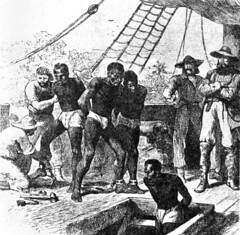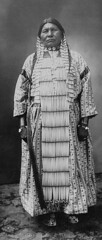AMSCO United States History 2015 Edition, Chapter 1 A New World of Many Cultures, 1491-1607
| 7843651428 | Corn | This was an important cultivated crop of the Mayas and the Incas. (p. 2) |  | 0 |
| 7843651429 | Horses | Not until the 17th century the American Indians acquired these animals from the Spanish. (p. 4) |  | 1 |
| 7843651430 | Disease | When Europeans came to America they brought smallpox and measles to which the natives had no resistance. 90% of the natives died. (p. 8) | 2 | |
| 7843651431 | Encomienda System | King of Spain gave grants of land and natives (as slaves) to individual Spaniards. (p. 8) |  | 3 |
| 7843651432 | Asiento System | The tax to the King of Spain for the imported slaves that they brought from West Africa. (p. 8) |  | 4 |
| 7843651433 | Slavery | As far back as the 1500s the Spanish brought captured Africans to America to provide labor. (p. 11) |  | 5 |
| 7843651434 | Land Bridge | Some time between 10,000 and 40,000 years ago people migrated from Asia to the Americas across this area that connected Siberia and Alaska. (p. 2) |  | 6 |
| 7843651435 | Adena-Hopewell | American Indian culture centered in Ohio created large earthen mounds as tall as 300 feet. (p. 4) |  | 7 |
| 7843651436 | Hokokam, Anasazi, and Pueblos | American Indians located in the New Mexico and Arizona region. They developed farming using irrigation systems. (p. 4) |  | 8 |
| 7843651437 | Woodland mound builders | American Indian tribe east of the Mississippi. (p. 4) |  | 9 |
| 7843651438 | Lakota Sioux | American Indian tribe that started using horses in the 17th century. This allowed them to move from farming to nomadic buffalo hunting. (p. 4) |  | 10 |
| 7843651439 | Mayas | From A.D. 300 to 800 this highly developed civilization built large cities in what is today's southern Mexico and Guatemala. (p. 2) |  | 11 |
| 7843651440 | Incas | This highly developed civilization developed a vast South American empire based in Peru. (p. 2) |  | 12 |
| 7843651441 | Aztecs | Starting about 1300 this civilization flourished in central Mexico. (p. 2) |  | 13 |
| 7843651442 | Conquistadores | These Spanish explorers and conquerors of the Americas sent ships loaded with gold and silver back to Spain making it the richest and most powerful nation in Europe. (p. 8) |  | 14 |
| 7843651443 | Native Americans | The first people to settle North America arrived as many as 40,000 years ago. They came from Asia and may have crossed by a land bridge connecting Siberia and Alaska. (p. 1) |  | 15 |
| 7843651444 | Francisco Pizarro | Conquered the Incas in Peru. (p. 8) |  | 16 |
| 7843651445 | Hernan Cortes | Conquered the Aztecs in Mexico. (p. 8) |  | 17 |
| 7843651446 | New Laws of 1542 | Bartolome de Las Casas convinced the King of Spain to institute these laws, which ended American Indian slavery, ended forced Indian labor, began the process of ending the encomienda systems. (p. 11) |  | 18 |
| 7843651447 | Roanoke Island | In 1587 Sir Walter Raleigh attempted to establish a settlement here, but it failed. (p. 9) |  | 19 |
| 7843651448 | Compass | One aspect of the Renaissance was a gradual increase in scientific knowledge and technological change; europeans made improvements in the inventions of others (chinese and arab merchants) |  | 20 |
| 7843651449 | Printing Press | This invention in the 1450s spread knowledge across Europe. (p 5) |  | 21 |
| 7843651450 | Ferdinand and Isabella | They united Spain, defeated and drove out the Moors. In 1492 they funded Christopher Columbus's voyage to America. (p. 5) |  | 22 |
| 7843651451 | Protestant Reformation | in the early 1500s, certain christians in germany, england, france, holland, and other northern european countries revolted against the authority of the pope in rome |  | 23 |
| 7843651452 | Henry the Navigator | The monarch of Portugal. (p. 7) |  | 24 |
| 7843651453 | Christopher Columbus | He spent 8 years seeking financial support for his plan to sail west from Europe to the "Indies". His success in discovering lands on the other side of the ocean brought him a burst of glory in Spain. |  | 25 |
| 7843651454 | Slave Trade | 26 | ||
| 7843651455 | Nation-state | A country in which the majority of people share both a common culture and common political loyalties toward a central government. | 27 | |
| 7843651456 | Algonquian | The American Indians had 20 language families and 400 distinct languages. This tribe in the Northeast was one of the largest. (p. 4) |  | 28 |
| 7843651457 | Siouan | The American Indians had 20 language families and 400 distinct languages. This tribe from the Great Plains was one of the largest. (p. 4) |  | 29 |
| 7843651458 | Iroquois Confederation | A political union of five independent American Indian tribes in the Mohawk Valley of New York. (p. 5) |  | 30 |
| 7843651459 | Longhouses | American Indians along the Pacific Coast lived in the these plank houses. (p. 4) |  | 31 |
| 7843651460 | John Cabot | An Italian sea captain who was under contract to England's King Henry VII, he explored the coast of Newfoundland in 1497. |  | 32 |
| 7843651461 | Treaty of Tordesillas (1494) | moved the line papal line a few degrees to the west; signed by spain and portugal |  | 33 |
| 7843651462 | Jacques Cartier | Explored the St. Lawrence River. |  | 34 |
| 7843651463 | Samuel de Champlain | Established the first permanent french settlement at quebec, a fortified village on the St. Lawrence River. |  | 35 |
| 7843651464 | Henry Hudson | Hired by the dutch government to seek a northwest passage; sailed up a broad river and established dutch claims to the surrounding area that would become new amsterdam (and later new york) |  | 36 |
| 7843651465 | Bartolome de Las Casa | A Spanish priest who was an advocate for better treatment of Indians. (p. 11) |  | 37 |
| 7843651466 | Valladolid Debate | In 1550-1551 in Valladolid, Spain a formal debate concerning the American Indians. (p. 11) |  | 38 |
| 7843651467 | Juan Gines de Sepulveda | Spaniard that argued that the American Indians were less than human. (p. 11) |  | 39 |

